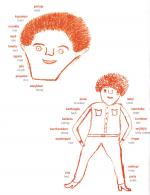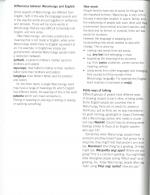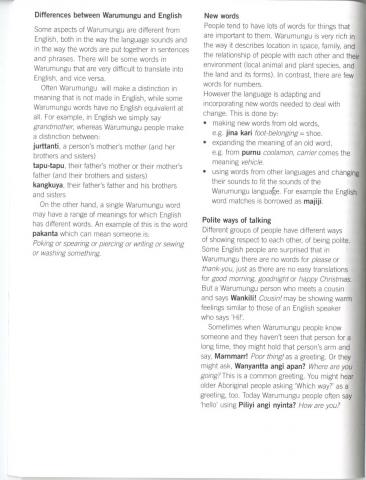Wapparr: Language (page 6)
Differences between Warumungu and English
Some aspects of Warumungu are different from English, Both in a way the language sounds and in the way the words are put together in sentences and phrases. There will be some words in Warumungu that are very difficult to translate into English, and vice versa. Often Warumungu will make a distinction in meaning that is not made in English, while some Warumungu words have no English equivalent at all. For example, in English we simply say grandmother, whereas Warumungu people make a distinction between:
- jurttanti, a person's mother's mother (and her brothers and sisters)
- tapu-tapu, their father's mother or their mother's father (and their brothers and sisters)
- kanguya, their father's father and his brothers and sisters
On the other hand, a single Warumungu word may have a range of meanings for which English has different words. An example of this is the word pakanta which can mean someone is: Poking or spearing or piercing or writing or sewing or washing something.
New Words
People tend to have lots of words for things that are important to them. Warumungu is very rich in the way it describes location in space, family, and the relationship of people with each other and their environment (local animal and plant species, and the land and its forms). In contrast, there are few words for numbers.
However the language is adapting and incorporating new words needed to deal with change.This is done by:
- making new words from old words, e.g. jina kari foot-belongings = shoe.
- expanding the meaning of an old word, e.g. from purnu coolamon, carrier comes from the meaning vehicle.
- using words from other languages and changing their sounds to fit the sounds of the Warumungu language. For example the English word matches is borrowed as majiji.
Polite ways of talking
Different groups of people have different ways of showing respect to each other, of being polite. Some English people are surprised that in Warumungu there are no words for please or thank-you, just as there are no easy translations for good morning, goodnight or happy Christmas. But a Warumungu persion who meets a cousin says Wankili! Cousin! may be showing warm feelings similar to those of an Englush speaker who says 'Hi!'
Sometimes when Warumungu people know someone and they haven't seen that person for a long time, they might hold that person's arm and say, Marnmarr! Poor Thing! as a greeting. Or they might ask, Wanyantta andgi apan? Where are you going? This is a common greeting. You might hear older Aboriginal people ask 'Which way?' as a greeting, too. Today Warumungu people often say 'hello' using Piliyi angi nyinta? How are you?








